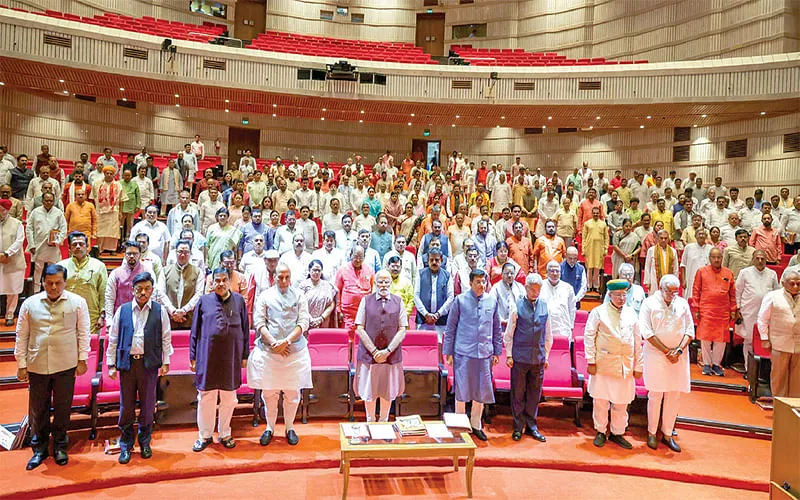Prime Minister Narendra Modi inaugurated the 17th Pravasi Bharatiya Divas Convention on January 9. This edition of the event was held in Indore in, as Modi said, “its original form and with all its grandeur after almost four years”. Significantly, the chief and special guests on the occasion were the Presidents of two neighbouring South American countries—Mohamad Irfaan Ali of Guyana and Chandrikapersad Santokhi of Suriname. The ancestors of both leaders trace their origin to India. While Guyana was a British Colony, Suriname was that of Holland but Indian indentured labour went to both countries and their descendants play an important role in the politics of both countries. The fact that both leaders came to the same Convention also demonstrates that they consider that India can make a contribution to their two countries development processes.
In his inaugural address Modi said “The nation has entered the ‘Amrit Kaal’ of the next twenty-five years. Our Pravasi Bharatiyas have a significant place in this journey. India’s unique global vision and its important role in the global order will be strengthened by you”. Modi and the ruling dispensation have always desired a strong connect with expatriate Indian communities in foreign lands. They have wanted these communities to preserve their Indian inheritance and also act as bridges between the lands of their adoption and India. The Modi government is paying ever greater emphasis on this aspect and it is now an important part of India’s foreign policy and diplomacy. It is therefore not at all surprising that Modi has forthrightly said that expatriate Indian communities have an important role in India’s ‘journey’ over the next quarter of a century.
Over the past six decades Indian communities have gained political and economic power in many countries and have put down strong roots in their adopted countries. In almost all cases expatriate Indians are proud of their Indian cultural heritage. Indeed in the case of Indian communities which have descended from those who suffered the indignities, cruelties and exploitation of the indentured system, Indian values and culture immensely helped them to retain their individuality and gain commercial, professional and even political success. As India’s weight has grown in world affairs over the decades expatriate Indian communities have also desired to strengthen their connect with India. This is therefore a mutual process which is both in India’s and the expatriate communities and their leaders interests. This perspective was well demonstrated in the address of Guyana’s President Irfaan Ali at the inaugural session of Global Investors on January 11, the concluding day of the Conference.
In an impressive speech Irfan Ali praised the Indian private sector for succeeding in establishing a global footprint with ‘transformative’ companies. He went on to praise the Indian government which had created the right ‘eco-system’ which had enabled the private sector to grow and innovate. It is significant that the President of a country which is the shadow of the US and on the tip of South America celebrated what the Indian private sector is doing. Often, it is the view from outside that gives a perspective on a part of a country’s polity, commerce or society which may escape a country’s own inhabitants. Hence, even if the fact that Ali wants the Indian private sector’s involvement in economic and commercial activity in Guyana may lead him to use good words but that he did so cannot be dismissed only on that ground.
Ali conceded that Guyana was a small country but gave the examples of the UAE and Qatar and the progress they had made. He said that like them Guyana wanted to be a world leader in many areas while ensuring safe and sustainable development. The country is massively forested. It can therefore ‘sell’ its carbon services. That will ensure funds to flow in while protecting the environment. Guyana also has rich carbon reserves. Ali said that in the next two years it will produce 1.2 million barrels per day of oil crude. He said that hydrocarbons will stay for the foreseeable future. The question therefore was which countries will be allowed to produce it. He complained that the existing producers did not want competition; hence, there was a need for a new Investment World Order. There is merit in Ali’s complaint but international business has never proceeded on the basis of justice but on interests. And, if a country or company in order to promote its own has to play ‘dirty’ it seldom shows any reluctance to do so.
While inviting Indian companies to invest in vast opportunities available in Guyana in the agriculture and tourism sectors Irfaan Ali disclosed an interesting ambition of making his country as the “Mecca” of cricket in his part of the world. He cautioned the Indian Cricket Board to understand and align itself with these ambitions lest it makes the same mistake that was made by the English and Australian Cricket Boards who controlled cricket in an earlier era. These Boards were complacent and found that they were consigned to the margins and their place at the pinnacle was taken over by the Indian Board. Ali implied that opportunities existed to expand cricket’s footprint in North America and Canada. As sports is big business now it may not be easy to change the interest of the people of this region from their traditional sports but Ali’s words should not be dismissed as impractical.
All in all the message which Ali gave and this would resonate with Indian expatriate communities all over is that the course for the future lies in India and these communities protecting and promoting their mutual interests. Culture is an important foundation but eventually interests prevail.







